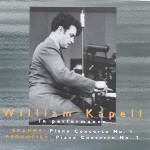William Kapell’s 1953 New York Philharmonic performance of the Brahms D minor Concerto reveals the extent to which the short-lived pianist had internalized this gnarly work since his 1946 encounter, preserved in the Philadelphia Orchestra’s centenary box set. His playing is more subjective, volatile, and daring in the outer movements. Some of his torpedo blasts, to be sure, miss their target, yet the pianist is clearly caught up in the composer’s dynamic surges and heroic contours. Kapell waxes expansively in the slow movement, savoring each lyrical drop without overstaying his welcome. After a shaky start, Mitropoulos marshals his orchestral forces, notwithstanding more than a few moments of poor coordination between pit and piano. The sound is light years better than the Melodram edition of this performance. Unlike the Brahms, Kapell recorded the Prokofiev Third Concerto commercially; but this live New York Philharmonic version is more vivacious, tender, and better-played, thanks in part to Leopold Stokowski’s buoyant, sympathetic conducting. If you missed this disc the first time around, now’s the time to grab it at mid-price. Kapell biographer Tim Page’s booklet notes couldn’t be better. An indispensable release for Kapell fans.
































